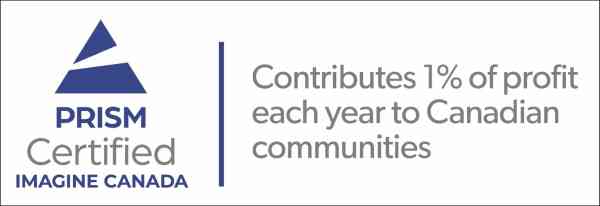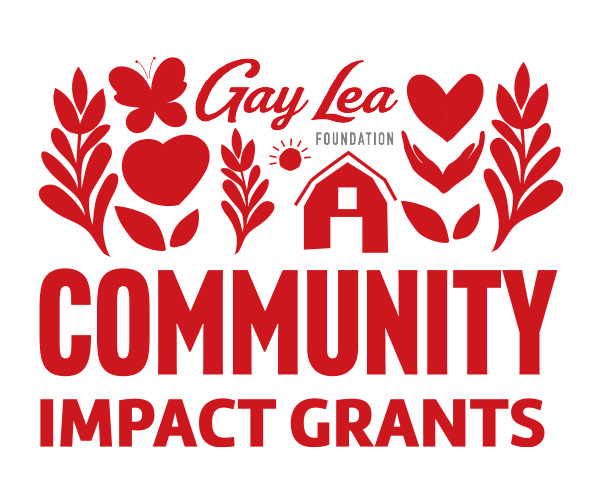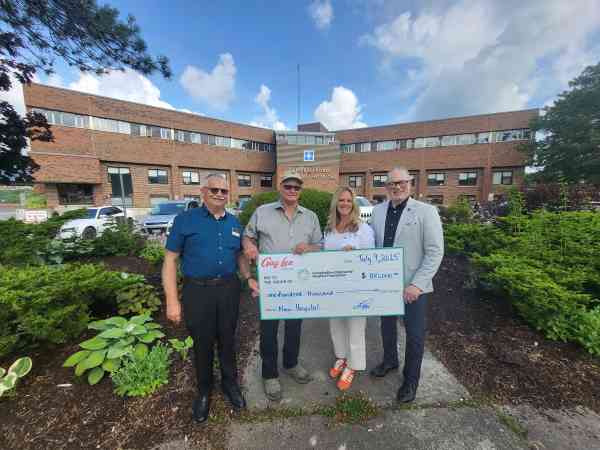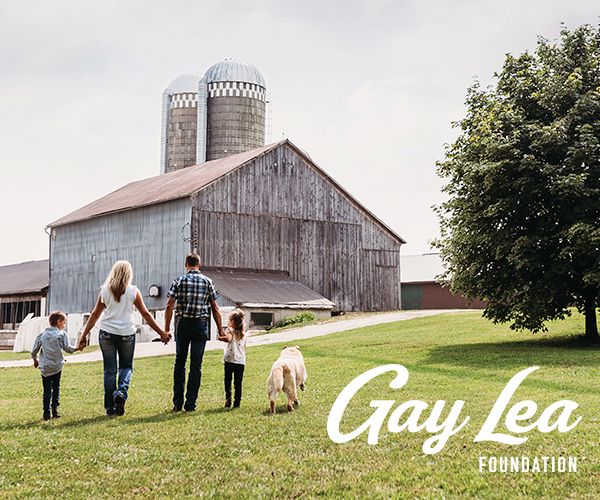Jun 4, 2021
Spring funding round provides support for humanitarian and community development projects in Canada and Africa
The Gay Lea Foundation is pleased to announce the outcome of its spring funding round, which will see more than $176,000 channelled to humanitarian and community development projects in Canada, Egypt, Rwanda, Tanzania, Kenya, and the Democratic Republic of Congo. The grants—made possible through financial contributions from Gay Lea Foods, its employees, and its farmer members—have been awarded to 15 Canadian charities selected from a pool of more than 70 applicants by the Foundation’s Board of Directors, comprised of Gay Lea Foods employees, delegates, directors and farmer members. “We’ve seen a significant increase in applications to our Foundation over the past year and a half,” says Foundation chair Janet Ringelberg, an Ontario dairy farmer and delegate of Gay Lea Foods. “On one hand, it’s encouraging to know there are so many Canadian charitable organizations dedicated to helping those in need—and there is so much need in our communities—but it also makes our job on the Foundation board very difficult.” “We hope these contributions will help foster growth, cultivate opportunity, and make a positive impact on the lives of others”. Since its creation in 2014, the Gay Lea Foundation has provided more than $1.5 Million in funding to support 98 unique poverty relief, community development and education projects in Canada and around the world. Read on to learn about the 15 charities selected to receive support from the Gay Lea Foundation this spring and the inspiring work they’ve undertaken to provide hope and promise for families and communities.
Canada Africa Community Health Alliance
The Canada Africa Community Health Alliance (CACHA) seeks to improve the health of rural communities in Africa by working with local groups to facilitate programs and initiatives for disease prevention, treatment, care, support, and education for the vulnerable in Bénin, Tanzania, Democratic Republic of Congo, and Uganda.
Project: The Tchukudu Women’s Training Centre Expansion
In the eastern city of Goma in the Democratic Republic of Congo (DRC), CACHA manages the Tchukudu Women’s Training Centre (TWTC) – a small, two-room building where women who have fled their villages due to ongoing violence in the area can learn new skills to support themselves and their families in the city. This year, in partnership with Days for Girls Canada, CACHA will train more than 50 vulnerable women in advanced sewing and business skills so that they may create reusable sanitary pads and sell the pads as a group income-generating project. The project will benefit not only the women whose incomes will increase, but local women and girls who will now have access to menstrual health education along with affordable reusable sanitary pads, allowing them to continue going to school or work. To accommodate the project, CACHA is looking to expand the TWTC to include a modern workshop, two working rooms and separate space for storage.
Gay Lea Foundation grant: $27,641 to support the cost of expanding the Tchukudu Women’s Training Centre to accommodate the Reusable Sanitary Pad Project and other income generating projects, as well as provide a safe community meeting space for women.
Christie Refugee Welcome Centre
Located in downtown Toronto, Christie Refugee Welcome Centre (CRWC) has provided emergency shelter, initial settlement services and follow-up support for refugee families from all ethnic, racial, or religious backgrounds since 1989.
Project: The Shelter Program CRWC’s Shelter Program is at the core of its services, supporting approximately 300 homeless refugee claimants (100 families) from around the world each year. The demand has taken a toll on the 76 beds at the shelter, many of which have not been replaced for more than 20 years.
Gay Lea Foundation grant: $8,000 to purchase 20 new bedframes and mattresses so that refugees may receive the dignified care, support, and assistance they need to pursue their refugee claim and begin their new lives in Canada.
Firefighters Without Borders
Firefighters Without Borders (FWB) is a volunteer organization that collects and ships donated fire, rescue, and safety equipment to fire services in need around the world and ensures communities are equipped with the appropriate knowledge and skills to fight fire emergencies and save lives. FWB focuses on sustainability and also places a strong emphasis on fire prevention through fire safety education, smoke alarm donations and prevention training.
Project: Construction and Operation of a Regional Firefighter Training Facility in Lac Seul First Nation
Responding to a vital need for equipment and training in emergency response tactics and fire prevention in First Nation communities, FWB is partnering with Lac Seul First Nation Fire and Emergency Services to construct a Regional Firefighter Training Facility in the remote Northern First Nation Community of Lac Seul, located near Sioux Lookout, Ontario. The facility will provide a safe training environment for Independent First Nations Alliance (IFNA) firefighters, whose members include five Northwestern Ontario First Nations communities. FWB will also supply donated firefighting clothing and protective equipment.
Gay Lea Foundation grant: $30,000 to support the construction of the facility in Lac Seul First Nation.
Global Peace Network
Global Peace Network undertakes projects to improve the health and livelihood of impoverished people and the environment that surrounds them, largely through health care and educational support in under-serviced communities in East Africa.
Project: Tanzania Rehabilitation Initiative With a goal to increase access to rehabilitation services for rural children and families in Tanzania—where physical disability is a significant burden due to a lack of appropriate childhood interventions—the Tanzania Rehabilitation Initiative enables front-line health care workers to upgrade their health care education through innovative clinical training and virtual clinics that amplify their capacity to deliver rehabilitative care to the under-served in their own communities.
Gay Lea Foundation grant: $12,923 to install a fibre optic connection between the rural Magu District Hospital in Tanzania and the local internet hub in town, allowing health care workers to access virtual programming and increase accessibility to rehabilitation services for rural children and families affected by disabilities in Magu District.
HOPEthiopia/Rwanda
With a mission to support and empower the most impoverished, marginalized, and vulnerable children, youth, and young adults in East Africa, HOPEthiopia and HOPEthiopia/Rwanda work to build communities and raise leaders of the next generation through projects aimed to strengthen education, employment, community, agriculture, reforestation, and medical care.
Project: Textiles-Training for marginalized young Rwandan women – Residential Program
Since 2012, HOPEthiopia/Rwanda has successfully operated a textiles-training center in Kigali, Rwanda, that trains marginalized young women in tailoring and embroidery, while also teaching community development principles, business skills, literacy, cooperative development, English, female reproductive health, and basic life skills. The usual intake is 20 young women for each 10-month training program, which includes all training expenses and materials, two meals per day and transportation assistance. Given the current pandemic and restrictions determined by the Rwandan government, however, the program had to be redesigned. HOPEthiopia/Rwanda will now offer on-site residence and three meals a day to reduced classes of 10 women at a time, at a significant increased cost per student.
Gay Lea Foundation grant: $8,120 to support the 10-month residential, all-inclusive tailoring training program for 10 young women in 2021.
International Needs Canada
With a global network of more than 30 partner countries around the world, International Needs Canada focuses primarily on the development and empowerment of vulnerable children, youth, and women through health and wellness, education, and skills training, and on empowering communities by helping them develop their own leadership potential.
Project: Real Hope Youth Community Organization Safe House
West of Nairobi, Kenya, in the heart of the Kawangware slum, more than 600,000 inhabitants live under the grip of extreme poverty. High unemployment has led to substance abuse and hazardous living conditions, particularly among children and youth. In 2014, International Needs Canada partnered with the Real Hope Youth Community Organization (RHYCO) to open a drop-in center that gives children and youth in Kawangware a safe place away from the dangers of the street and the abuses of home. When COVID-19 hit, however, it became clear that some children needed more than a drop-in center: they had to be removed from their homes as soon as possible. Subsequently, in the summer of 2020, RHYCO began renovations/construction on a gated safe house compound to shelter extremely at-risk children in Kawangware, and International Needs joined forces to appeal to its donors for funds. When complete, the compound will serve as a drop-in center for up to 70 street children and a safe house for up to 20.
Gay Lea Foundation grant: $15,000 to purchase materials needed to finish construction and cover some of the compound’s operating expenses and programming for the first year.
Jennifer Ashleigh Children’s Charity
Jennifer Ashleigh Children’s Charity (JACC) provides financial assistance to seriously ill, financially disadvantaged Ontario children and their families for emergency household expenses, groceries, respite care, various forms of physical therapy for disabled children, medications not covered, medical supplies and more. During 2020, in light of the COVID-19 pandemic, JACC placed a priority on helping children and families with costs related to the most basic needs of food and shelter.
Gay Lea Foundation grant: $5,000 to provide nutritious groceries for 3-5 seriously ill children and their families or to support physical therapy for 3-5 disabled children (speech, occupational, or physiotherapy), which is an out-of-pocket expense.
Owen Sound Hunger and Relief Effort (OSHaRE)
The Owen Sound Hunger and Relief Effort (OSHaRE) serves the people of Owen Sound and surrounding areas by providing nutritious meals, six days a week, for those in need. The organization also serves as a food sharing hub, taking in corporate food donations and “rescued” food from local grocery stores, and sharing it with more than 25 different community meal programs and food banks across Grey and Bruce Counties.
Project: Increased Support
In addition to having to modify its programming to serve meals “to go” because of COVID-19, OSHaRE has seen a significant increase in need since the onset of the pandemic. The organization has responded by adding weekday lunches to its regular Saturday-lunch and weekday dinner program (five additional take-out meals per week), while continuing to distribute at least 1.5 tonnes of food per month to smaller community partners across Grey and Bruce County.
Gay Lea Foundation grant: $10,000 to help OSHaRE continue to meet the increased needs of the local community.
Rising Out Of The Ashes
Rising Out Of The Ashes (ROOTA) works to alleviate poverty and enhance education. The organization is currently supporting the marginalized community of trash collectors in Cairo, Egypt, commonly referred to as The Zabaleen, through its work with the Association for the Protection of the Environment (APE), a civil society organization in Cairo.
Project: Concentrated Literacy Encounter (CLE)
ROOTA’s nine-month Concentrated Literacy Encounter empowers women in The Zabaleen Community by providing them with the literacy resources and support they need to join the formal education system, continue to a higher level of education, and find better jobs. Those who do not move on to a higher level of education will be taught a new skill which will benefit them in their daily lives.
Gay Lea Foundation grant: $5,000 to provide materials and equipment for the program, such as textbooks, pencils, erasers, whiteboards, etc.
Ronald McDonald House Charities South Central Ontario
Ronald McDonald House Charities® South Central Ontario (RMHC®SCO) is part of a network of 15 Ronald McDonald Houses across Canada. Located next to McMaster Children’s Hospital in Hamilton, RMHCSCO provides a warm, compassionate home away from home for families of children who are seriously ill or injured and being treated at nearby hospitals.
Project: Meals That Heal Program
With support from the community, the Meals That Heal program offers healthy, home-cooked meals to families staying at RMHCSCO, seven days a week, so they can be strong and have the energy to support their children. Prepared by an in-house culinary team, the meals can be eaten in the RMHCSCO dining room or taken to eat in the hospital or elsewhere.
Gay Lea Foundation grant: $7,000 to provide 20 nutritious meals to families staying at RMHCSCO between the months of September to December 2021.
Sherbourne Health
Located in downtown Toronto, Sherbourne Health provides integrated health services, community development programs and capacity-building initiatives that enable people and diverse communities to achieve wellness. Sherbourne’s doors are open to everyone, with a focus on LGBT2SQ communities, people experiencing homelessness, refugees, and newcomers to Canada.
Project: Food for Good COVID-19 Relief Initiative
COVID-19 has had a dramatic impact on the services and programs offered by Sherbourne Health, limiting options for in-person contact and the opportunity to provide meals to clients as they visit the facility on Sherbourne Street. Concerned that many of their clients were facing serious food insecurity, Sherbourne began to create food hampers that could be picked up or delivered, as well as takeaway lunches for clients of various programs. They also began to offer enhanced food and meal assistance at their catering collective in the St. James Town community and through a mobile health unit that travels the city providing medical and mental health supports to shelters and individuals experiencing homelessness.
Gay Lea Foundation grant: $3,000 to supply approximately 75 food hampers with fresh fruits, vegetables, dairy, meats and/or meat alternatives and provide approximately 75 meals at St. James Town catering collective, as part of the Food for Good 2021 COVID-19 Relief Initiative.
Shine Through The Rain Foundation
Shine Through The Rain does many things, but all in the service of one goal: to help those affected by life threatening illnesses. Whether it’s through services or funds, they provide guidance, support, and financial aid to adults, children, and families in need. When things seem gloomy and you’re being rained on, they’re here to help you shine through it.
Project: Rural Rainy-Day Grocery & Shelter Program
Recognizing the unique burdens faced by rural patients, including travel to and from medical appointments and hospitals in distant urban centres, parking fees, hotel stays, restaurant meals, and other expenses, the Rural Rainy-Day Grocery & Shelter Program provides grocery cards and/or payment of past-due rent/utilities for rural patients in need, helping to ensure they can recover in their own homes.
Gay Lea Foundation grant: $5,000 to support the program, which provides between $1,000 to $1,500 per patient, per year, in the form of grocery gift cards and/or past-due rent and utility payments.
Tearfund Canada
Tearfund Canada works with local agencies across Africa and Asia to help meet the needs of people living in poverty through emergency assistance (including food, shelter, medicines, and other necessities), integrated development programs, agricultural training, primary health care, and food security programs.
Project: Hope for Port Loko
The combined impacts of civil war and Ebola have decimated rural farming communities in Sierra Leone, Africa, where reduced incomes, lower food intake and poor nutrition have led to extreme poverty and strife. In 2018, Tearfund began a four-year project focused on bringing agricultural help to six farming villages in the district of Port Loko, where the majority of residents lived without reliable access to food. Over three years, they have successfully introduced 300 farming households to improved cassava planting and harvesting techniques (for both personal consumption and sale), helped the residents form 10 farming co-op groups, and funded the purchase of 10 cassava processing machines, which allow for efficient processing and sale of cassava. As production continues to grow and the farmers of Port Loko continue to work toward food self-sufficiency, economic opportunity and agricultural sustainability, the demand for cassava processing has grown.
Gay Lea Foundation grant: $25,000 to fund the purchase of 10 additional cassava processing machines for the 10 farming co-ops in Port Loko, and to provide the corresponding processing and market training to help each co-op group mechanize and modernize their farming practices.
The Doorway
The Doorway provides opportunities for youth in Calgary aged 17-24 who want to exit the streets and build independent and sustainable lives in society. Using a two-year, step-by-step planning process called MyPlan, the organization supports youth as they identify and determine for themselves what they need to do to get off the streets and plan for longer-term change.
Project: MyPlan Critical Path Planning Program
As part of The Doorway’s two-year MyPlan program, participants use specially designed software to facilitate a 200-step planning process that focuses on 13 life categories: Housing, Legal, Planning, Finances, Identification, Problem Solving, Health, Drugs, Employment, Education, Personal, Leadership and Volunteerism. They then discuss it with a volunteer or staff member and make a contract and commitment to themselves. Participants are paid a $15 incentive for each goal they reach to a maximum of eight steps per month. The program consistently sees between 60 and 70 per cent of participants off the street in two years.
Gay Lea Foundation grant: $5,000 to support participant incentives and other related costs for participants such as office supplies, food, transportation, emergency supports, household items, and anything else that a participant may need for their physical, mental, and social well-being.
Wellness and Emotional Support for Youth Online
Wellness and Emotional Support (WES) for Youth Online has been providing free, virtual counselling to Ontario youth ages 13-24 since 2013. The service is accessible, convenient, and private, allowing youth to connect with a professional counsellor by self-referral, regardless of their financial situation, physical location, privacy concerns or public health restrictions.
Project: Virtual Counselling
WES for Youth Online’s virtual counselling service allows youth to connect with a professional counsellor anytime, anywhere. Common reasons youth reach out for support include anxiety, depression, peer and parent relationships, sexual orientation and gender identity, managing stress, concerns about the future, grief, loss, and trauma. The service is currently offered through email (asynchronous communication) and live chat (synchronous communication) and allows for the development of long-lasting youth-counsellor relationships by connecting youth with the same counsellor each time they reach out for support.
Gay Lea Foundation grant: $10,000 to support the continuation of WES for Youth Online’s virtual counselling service.

Nov 3, 2025
Gay Lea Foods Co-operative Limited (“Gay Lea Foods”) today announced it has received the PRISM Certified designation from Imagine Canada, recognizing the Canadian dairy co-operative’s commitment to...

Oct 21, 2025
As co-operatives recognize Co-op Week and the United Nations’ International Year of Co-operatives, the Gay Lea Foundation is proud to announce the recipients of its fall 2025 charitable grants.

Jun 2, 2025
Spring 2025 grants announced to support health, agriculture, and community well-being projects across Canada and internationally

Feb 12, 2025
The Gay Lea Foundation today announced applications are now open for its Community Impact Grants program, supporting initiatives in education, health, wellness, poverty relief and sustainable agriculture...